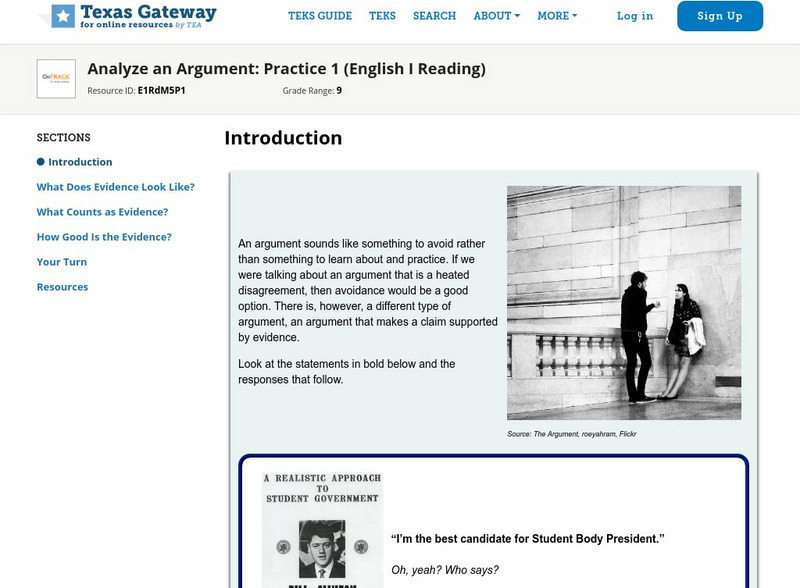Stanford University
Sheg: Document Based History: Reading Like a Historian: Evaluating Sources
[Free Registration/Login Required] Are all historical sources equally trustworthy? How might the reliability of a historical document be affected by the circumstances under which it was created? In this activity, students sharpen their...
Other
Classroom Tech: Evaluating Web Credibility
There is a vast amount of information on the internet, but how much of it is credible? This site presents tips on how to verify the information on a website and not be fooled by web "spoofs". Refer to the checklist for evaluating sources.
Texas Education Agency
Texas Gateway: Analyze the Relevance, Quality, and Credibility of Evidence
[Accessible by TX Educators. Free Registration/Login Required] In this lesson, students will learn to analyze the quality, relevance, and credibility of evidence used to support an argument.
Other
Who Is Hosting This: How to Evaluate Web Resources
This is an excellent, compact guide to evaluating resources on the Internet. It breaks everything down into easy steps and tells you how to do each. Included is an infographic called 'Evaluating Web Resources: A 60 Second Guide.' It also...
Sophia Learning
Sophia: Evaluating Digital Information: Tutorial
In this slideshow tutorial, students will review how to evaluate digital sources. During the digital evaluation process, students are directed to analyze the following: authority, accuracy, objectivity, and currency. After the tutorial,...
PBS
Pbs Learning Media: News and Media Literacy
This collection, which includes videos, blog articles, student handouts, lesson plans, and tip sheets for families, helps students identify, analyze, and investigate the news and information they get from online sources. Media literacy...
Texas Education Agency
Texas Gateway: Analyze an Argument: Practice 1 (English I Reading)
In this lesson, students practice analyzing the evidence that supports or opposes an argument. They are also going to learn to analyze the quality, relevance, and credibility of the evidence so you can decide whether to accept the...
ReadWriteThink
Read Write Think: Hoax/no Hoax? Online Comprehension and Evaluation Strategies
Students use research-based comprehension strategies to read and evaluate websites, and practice analysis by comparing hoax and real websites and by identifying false or misleading information. SL.11-12.2 Eval&Integrate sources
Other
Media Education Lab: My Pop Studio
[Free Registration/Login Required] Get ready to go behind-the-scenes of the television you watch, magazines you read, music you listen to, and websites you visit! The 'studios' let you.. Create, Comment, Control. Targeted at girls, the...
Other
Information Literacy Activities
These worksheets cover many aspects of the research process, as well as censorship, web page evaluation and boolean operators.
Thinkport Education
Thinkport: Assessing an Author's Claims
Learn how to evaluate resoruces and author's claims.
Other
Scholarly Resources: What's the Difference?
This succinct explanation shows you what the difference is between a scholarly and a popular periodical or other resource.








